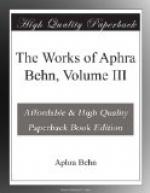p. 18 Glass Coach. Coaches with glasses were a recent invention and very fashionable amongst the courtiers and ladies of the Restoration. De Grammont tells in his Memoirs how he presented a French calash with glasses to the King, and how, after the Queen and the Duchess of York, had publicly appeared in it, a battle royal took place between Lady Castlemaine and Miss Stewart as to which of the two should first be seen therein on a fine day in Hyde Park. The Ultimum Vale of John Carleton (4to, 1663) says, ’I could wish her coach ... made of the new fashion, with glass, very stately, ... was come for me.’
p. 20 Tom Dove. A well-known bear so named and exhibited at the Bear Garden. Besides this passage there are four other allusions to him to be found. Dryden’s Epilogue to the King and Queen at the Union of the Two Companies, 1682, has:—
Then for your lacquies ...
They roar so loud, you’d
think behind the stairs,
Tom Dove, and all the brotherhood
of bears.
His prologue to Vanbrugh’s alteration of The Pilgrim (1700) begins:—
How wretched is the fate of
those who write!
Brought muzzled to the stage,
for fear they bite;
Where, like Tom Dove, they
stand the common foe.
In Southerne’s The Maid’s Last Prayer (1693) Act ii, II, Granger on receiving an invitation to dinner cries: ’Zounds! a man had as good be ty’d to a stake and baited like Tom Dove on Easter Monday as be the necessary appurtenance of a great man’s table!’ D’Urfey in the epilogue (spoken by Verbruggen) to Robert Gould’s The Rival Sisters; or, The Violence of Love, produced at Drury Lane in 1696, writes:—
When the dull Crowd, unskilled
in these Affairs,
To day wou’d laugh with
us, to morrow with the Bears:
Careless which Pastime did
most Witty prove,
Or who pleas’d best,
Tom Poet, or Tom Dove.
Tom Dove has been wrongly described as ‘a bearward.’
p. 22 Southampton House. Southampton House, Bloomsbury, occupied the whole of the north side of the present Bloomsbury Square. It had ’a curious garden behind, which lieth open to the fields,’—Strype. A great rendezvous for duellists, cf. Epilogue to Mountfort’s Greenwich Park (Drury Lane, 1691) spoken by Mrs. Mountfort:—
If you’re displeased
with what you’ve seen to-night
Behind Southampton House we’ll
do you right;
Who is’t dares draw
’gainst me and Mrs. Knight?
p. 39 Nickers. Vide note (p. 456) Vol. I, p. 398, The Roundheads.
p. 41 Courant. A quick, lively dance frequently referred to in old dramatists.
p. 43 A Jigg. There were, in Post-Restoration times, two interpretations of the word Jig. Commonly speaking it was taken to mean exactly what it would now, a simple dance. Nell Gwynne and Moll Davis were noted for the dancing of Jigs. cf. Epilogue to Buckingham’s The Chances (1682):—




